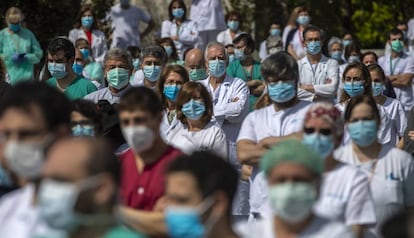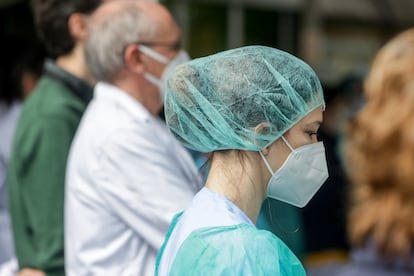Faulty batch of face masks prompts the isolation of more than a thousand Spanish healthcare staff
The Health Ministry has admitted that the lack of personal protective equipment since the coronavirus crisis began has led to infections among medical workers

More than a thousand Spanish healthcare workers are in isolation and thousands more will have to be tested for SARS-CoV-2 after being exposed to the novel coronavirus due to defective face masks. The batch of faulty material was ordered to be withdrawn on Friday. There is no exact figure as yet as to how many staff used the items, and the Health Ministry does not know how many masks from the batch of 350,000 to 400,000, according to sources, did not meet the requirements.
The personal protective equipment (PPE) was aimed at alleviating the needs of healthcare teams, who have been complaining of a lack of material since the coronavirus crisis began to take hold in Spain in the middle of February.
The issues with the supply of PPE have contributed to the more than 31,000 healthcare professionals who have contracted the virus, with dozens of official deaths so far including 34 doctors. The real figure is likely to be much higher. Among nursing staff, there are thought to be 70,000 coronavirus cases, according to a recent survey by a nurses association.
The provision of protective equipment is irregular and insufficientCSIF civil servant union
The complaints among healthcare professionals, who account for 15% of total infections in Spain, are widespread. The Health Ministry itself has recognized the link between the infections and the lack of material, in a report it updated on Friday entitled “Scientific-technical information on the coronavirus-19 disease.” The document explains that the causes of this “high contagion” rate among health staff could be down to personnel being “improperly protected.” First, because there was initially no awareness of the risk of infection presented by asymptomatic patients, and second, “due to the serious global [PPE] shortage problem.”
The batch of masks, which was acquired from the Chinese firm Garry Galaxy, was supposed to alleviate the shortage of PPE in Spain. But on Friday it became clear that the material was defective, after having been in use for 10 days – the material was distributed during Easter week, something that further complicates determining who had been using it.
Some of the material is still yet to be withdrawn, but Spain’s regions, who each have their own healthcare system, are in the process of identifying staff who may have been exposed.
The strictest measures have been taken by Murcia, in southeastern Spain, where more than 1,100 professionals have been isolated. Andalusia, which detected 12 positives, and the Balearic Islands, which used 2,800 units from a batch of 30,000, have adopted similar measures with three and four professionals, respectively, who used the defective masks and could have been exposed to the coronavirus.

But in general the data is unclear. On Friday, the Basque Country health chief, Nekane Murga, stated that the regional health system “had received 124,000 masks from the Garry Galaxy brand, although we do not know how many of these were defective. From that total, 13,200 were distributed among health professionals and institutions, but we do not know how many of these were defective.”
Information from the Satse union (nursing) and CSIF (civil servants) reveals that the material was sent out to all regions (there is no data about Asturias, however). “I found out about it on Friday morning from the press and I ordered it to be withdrawn,” said Isabel Camacho, a nurse at a healthcare center in Marchamalo, Guadalajara. “In the afternoon we got the order from the health department. We received the material on [April 7] and we have used it until now. Of course, because we didn’t have [any PPE], we were pleased when it arrived. We were using home-made material that some of us had made.”
Camacho explained that she had not received any official notification since Friday, and that her healthcare center has only been told to send back the unused masks that were left. She had not received any indications about the staff who have been exposed, and was following the same protocol observed until now: to work if there are no symptoms, and if they appear, isolate at home until a coronavirus test can be carried out.
There are people who worked the whole day using a mask that offers 10 minutes of protectionGeneral Council of Nursing Associations
Despite these issues, healthcare professionals have reported that the situation with PPE has improved in the last month. “You are no longer seeing the photos that I described at the time as Dantesque of staff with aprons made of trash bags and wearing washing-up gloves,” said the president of the Organization of Medical Colleges (OMC), Serafín Romero. But, he explains, this has been achieved thanks to “extreme measures of care and extending the time periods for usage and recycling [of PPE], always taking great care.”
Romero explained that there are still issues with the supply of PPE, in particular in the private health system. “We are still lacking FFP2 and FFP3 masks,” said José Luis Llisterri, the president of the Semergen doctors association, in reference to the face coverings that offer the highest levels of protection. “And tests,” he added.
“The provision of protective equipment is irregular and insufficient,” said the CSIF union. “This is the general trend in the national health system. The serious situation due to the absence of supply has been overcome, and [PPE] is arriving, but it is not being evenly distributed.”
Until data is collated from unions and regional health departments it will be impossible to know how many health workers used the defective masks between April 7, when they were sent, and April 18, when they were ordered to be withdrawn.
“The arrival of the masks did not see us lower our safety measures,” said nurse Isabel Camacho. “But there is great concern now.” “There are people who worked the whole day using a mask that offers 10 minutes of protection,” said the General Council of Nursing Associations.
Given the date that the material was first distributed, there has been time for health workers who may have been exposed to the coronavirus to start to show symptoms. However, a report from the Catalan Health Institute found that “there has not been a rise in the number of cases.”
With reporting by Virginia Vadillo, Pedro Gorospe, Cristina Vázquez, Cristina Huete and Eva Saiz.
English version by Simon Hunter.
Tu suscripción se está usando en otro dispositivo
¿Quieres añadir otro usuario a tu suscripción?
Si continúas leyendo en este dispositivo, no se podrá leer en el otro.
FlechaTu suscripción se está usando en otro dispositivo y solo puedes acceder a EL PAÍS desde un dispositivo a la vez.
Si quieres compartir tu cuenta, cambia tu suscripción a la modalidad Premium, así podrás añadir otro usuario. Cada uno accederá con su propia cuenta de email, lo que os permitirá personalizar vuestra experiencia en EL PAÍS.
¿Tienes una suscripción de empresa? Accede aquí para contratar más cuentas.
En el caso de no saber quién está usando tu cuenta, te recomendamos cambiar tu contraseña aquí.
Si decides continuar compartiendo tu cuenta, este mensaje se mostrará en tu dispositivo y en el de la otra persona que está usando tu cuenta de forma indefinida, afectando a tu experiencia de lectura. Puedes consultar aquí los términos y condiciones de la suscripción digital.








































